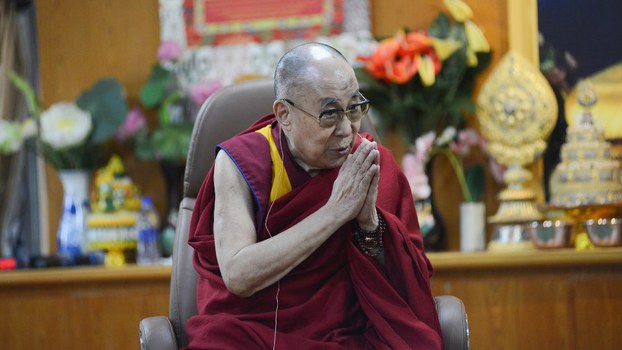Tibetet Segítő Társaság Sambhala Tibet Központ
Tibet Support Association Sambhala Tibet Center
székhely / telephely H-Budapest I. Attila út 123..
(00-36) 70 431 9343 (00-36)70 944 0260 (06-1)782 7721
sambhala@tibet.hu www.tibet.hu tibetpress.info
Facebook/Sambhala Tibet Központ Facebook/Tibett Segítő Társaság
MagnetBank/ 16200010-00110240
IBAN/HU94 16200010 00110240 00000000 SWIFT/HBWEHUHB
(1%) adószám/ 18061347-1-41
nyitva tartás/hétköznap 12.00-20.00 hétvégén előadás függő
» tibeti művészet» lapszemle.hu» thetibetpost.com» eastinfo.hu» rangzen.net» ChoegyalTenzin» tibet.net» phayul.com» DalaiLama.com» vilaghelyzete.blogspot.com» Videók» Linkek» TibetiHírek» Szerkesztőség
Tibetan Religious Figures Reject Chinese Role in Dalai Lama Reincarnation/ENG
2019. november 27./RFA/TibetPress
eredeti cikk
Top Tibetan religious leaders gathered in Dharamsala, India this week have resolved that the choice of successor to the Dalai Lama will be made according to tradition and left to the 84-year-old spiritual leader, with no interference from China.
The Nov 27-29 14th Tibetan Religious Conference convened at the seat of the exiled Tibetan government and produced the special “Dharamsala Declaration” that sets out policy for the reincarnation of the Dalai Lama.
“All Tibetans genuinely wish for the continuation of the institution and reincarnation of the Dalai Lama in the future,” read the declaration.
“The authority of decision concerning the way and the manner in which the next reincarnation of the XIV Dalai Lama should appear solely rests with His Holiness the XIV Dalai Lama himself,” it said.
“No government … will have such authority. If the Government of the People’s Republic of China for political ends chooses a candidate for the Dalai Lama, the Tibetan people will not recognize and respect that candidate,” said the declaration.
“Regarding the method of recognizing the future reincarnations of the Dalai Lama, the same unique Tibetan traditional method, which has been continuously used until now, will be followed,” it added, noting that the method originated in Tibet more than 800 years ago.
Tibetan tradition holds that senior Buddhist monks are reincarnated in the body of a child after they die.
The current, 14th, Dalai Lama fled to India in 1959 following a Chinese crackdown on an uprising by Tibetans. India granted him political asylum and the Tibetan government-in-exile has been based in northern India’s Dharamsala since then.
The question of the successor to the Dalai Lama, who will preside over the Dharamsala religious gathering on Friday, is a major point of friction between Beijing, which insists on its right to select the next top Tibetan religious leader, and Tibetans inside their homeland and around the world.
In July, Wang Nengsheng, the director general of the Chinese-controlled Tibet Autonomous Region (TAR) government, caused a flap among Tibetans when he told a small group of Indian journalists in Lhasa that “the Dalai Lama's reincarnation is not decided by his personal wish or by some group of people living in other countries.”
Panchen Lama example
Contention over the Dalai Lama follows an earlier example of Chinese involvement in the reincarnation of a senior Tibetan lama 25 years ago
The Panchen Lama, Gedhun Choekyi Nyima, was recognized on May 14, 1995 at the age of six as the 11th Panchen Lama, the reincarnation of his predecessor, the 10th Panchen Lama.
The recognition by the Dalai Lama angered Chinese authorities, who three days later took the boy and his family into custody and then installed another boy, Gyaincain Norbu, as their own candidate in his place.
The whereabouts of the Dalai Lama’s choice of Panchen Lama, who turned 30 this year, remain unknown and he has not been seen in public since his disappearance.
The Panchen Lama installed by Beijing meanwhile remains unpopular with Tibetans both in exile and at home.
Last week, the U.S. envoy for religious freedom said he discussed the succession issue with the Dalai Lama during a visit to Dharamsala in October.
“The big issue we discussed was the succession of the Dalai Lama. He’s healthy, and he was telling me he is going to live 15 or 20 more years, and he showed me his muscles. He also is an 84-year-old man, and so there’s just concern about the succession,” said Sam Brownback, the U.S. Ambassador-at-Large for International Religious Freedom.
“And particularly the concern is that the Chinese Communist Party is claiming a right to appoint, or have some role in this, and they don’t. They’re a government, they don’t have that right,” he told RFA’s Tibetan Service in an interview on Nov. 21.
“So we’re putting forward the U.S. government position, which is that the succession decision belongs to Tibetan Buddhists. It belongs to their religious process and not to the Chinese Communist Party,” said Brownback.
Reported by Lobsang Gelek for RFA’s Tibetan Service. Translated by the Tibetan Service. Written by Paul Eckert.
